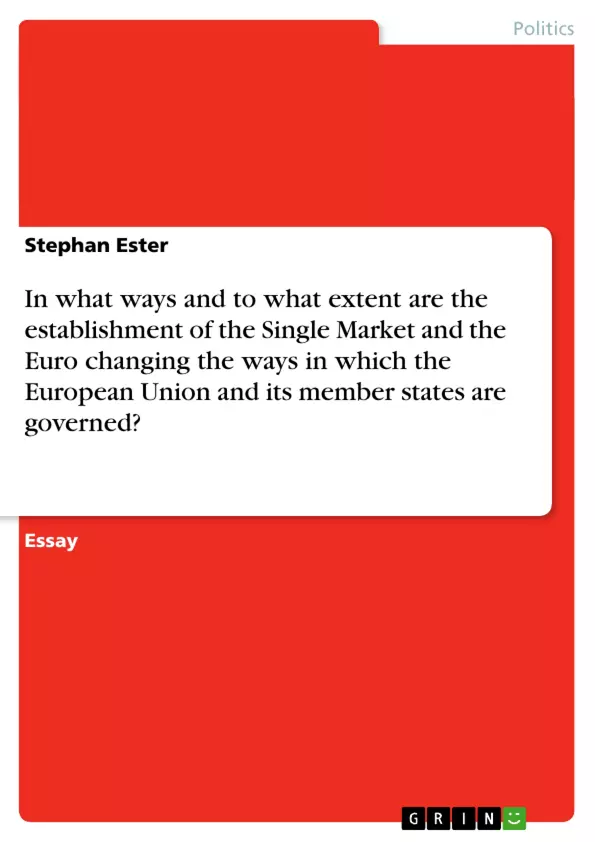Since the beginnings of the European Community, economic integration has led the way in the process of European integration as a whole. From its first outline in the 1957 Treaty of Rome to its final implementation into the first pillar of the European Union in the Maastricht Treaty of 1992, the creation of a single market and eventually a single currency has been central to the idea of creating a unified Europe and significantly shaped the European communities’ institutions and ways of governance. The coming into effect of the Single European Market (SEM) in 1993 and establishment of the Economic and Monetary Union (EMU) in 1999 have probably been the most far-reaching and incisive steps on the way to the economic and following political integration of Europe. In this essay, I will first discuss the impact of the SEM on the governance of the EU’s institutions and its member states, especially with regards to the process of setting common rules and regulations and their subsequent implementation into national law. In a second step, I will analyse the significance of EMU for the economic governance of the EU’s member states and its further implications for national sovereignty in this field. Finally, I will summarise the results of this essay and discuss the advantages as well as the political and economic problems that exist or might arise out of SEM and EMU in the future.
Inhaltsverzeichnis (Table of Contents)
- Introduction
- Implications of the Single Market for European Governance
- Negative and Positive Integration
- Key Policy Actors
- The Role of the ECJ
- Regulatory Federation
- Flanking Policies
- Uncompleted Integration
- Implications of Monetary Union for European Governance
Zielsetzung und Themenschwerpunkte (Objectives and Key Themes)
This essay examines the impact of the Single European Market (SEM) and the Economic and Monetary Union (EMU) on the governance of the European Union and its member states. It analyzes how these initiatives have reshaped the EU's institutions and the relationship between the EU and its member states, focusing on the processes of setting and implementing common rules and regulations.
- The impact of the SEM on EU governance and the relationship between EU and national institutions.
- The role of the European Commission, Council of Ministers, and European Court of Justice in SEM regulation.
- The implications of the EMU for economic governance and national sovereignty.
- The balance between supranational authority and national interests in EU policy-making.
- The ongoing challenges in achieving full market integration.
Zusammenfassung der Kapitel (Chapter Summaries)
The Introduction sets the context by highlighting the central role of economic integration in the development of the European Union, emphasizing the establishment of the SEM and EMU as pivotal steps. The section on Implications of the Single Market for European Governance discusses the mechanisms of negative and positive integration, identifies key policy actors (Commission, Council, ECJ), and examines the ECJ's role in ensuring compliance with EU law. The concept of a 'regulatory federation' is introduced to frame the nature of EU governance. Finally, this section acknowledges the limitations of the SEM's achievements and ongoing barriers to full integration. The section on Implications of Monetary Union for European Governance briefly introduces the creation of the Euro and its economic and political rationale. Further chapters would delve into these topics in more depth but are excluded here to avoid spoilers.
Schlüsselwörter (Keywords)
Single European Market (SEM), Economic and Monetary Union (EMU), European Union governance, supranational institutions, national sovereignty, regulatory federation, competition policy, market integration, monetary policy, EU law, ECJ.
Frequently Asked Questions
How did the Single European Market (SEM) change EU governance?
The SEM, established in 1993, reshaped the relationship between EU and national institutions by setting common rules and regulations that member states must implement into national law, creating a form of 'regulatory federation'.
What is the role of the European Court of Justice (ECJ) in the Single Market?
The ECJ plays a crucial role in ensuring compliance with EU law and resolving disputes, acting as a key policy actor in the process of negative and positive integration.
What are the implications of the Euro (EMU) for national sovereignty?
The Economic and Monetary Union (EMU) shifted significant economic governance powers to the supranational level, impacting the fiscal and monetary sovereignty of member states.
What is the difference between positive and negative integration in the EU?
Negative integration refers to the removal of barriers to trade, while positive integration involves the creation of common policies and regulations to harmonize the market.
What challenges remain for full European market integration?
Despite the SEM, full integration faces ongoing barriers, including uncompleted legislation and the balance between supranational authority and diverse national interests.
- Quote paper
- Stephan Ester (Author), 2006, In what ways and to what extent are the establishment of the Single Market and the Euro changing the ways in which the European Union and its member states are governed?, Munich, GRIN Verlag, https://www.grin.com/document/120914



